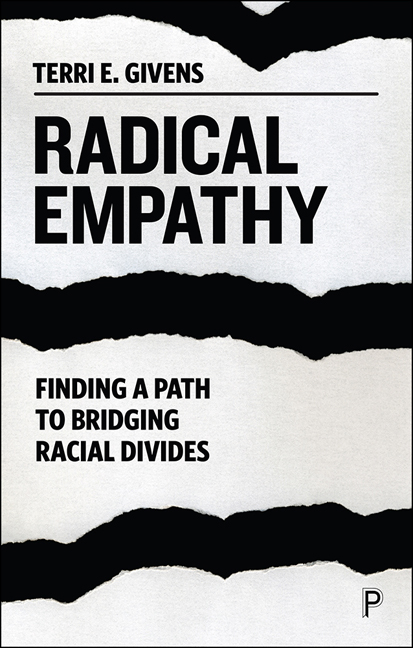Book contents
- Frontmatter
- Dedication
- Contents
- Note on the author
- Prologue:Writing in a time of crisis
- 1 Bridging divides: From racism to empathy in the 21st century
- 2 Getting to radical empathy
- 3 My family’s story: The isolation of internalized oppression
- 4 Racism and health disparities
- 5 Finding empathy in the academy
- 6 Love and marriage
- 7 Radical empathy in leadership: Creating change
- 8 Creating change at the national level: Restorative justice and working off the past
- 9 Revisiting the path to radical empathy
- Epilogue: The long road ahead
- Notes
- Suggested reading
- Index
1 - Bridging divides: From racism to empathy in the 21st century
Published online by Cambridge University Press: 05 January 2022
- Frontmatter
- Dedication
- Contents
- Note on the author
- Prologue:Writing in a time of crisis
- 1 Bridging divides: From racism to empathy in the 21st century
- 2 Getting to radical empathy
- 3 My family’s story: The isolation of internalized oppression
- 4 Racism and health disparities
- 5 Finding empathy in the academy
- 6 Love and marriage
- 7 Radical empathy in leadership: Creating change
- 8 Creating change at the national level: Restorative justice and working off the past
- 9 Revisiting the path to radical empathy
- Epilogue: The long road ahead
- Notes
- Suggested reading
- Index
Summary
I have always been a positive and hopeful person, but the 21st century has challenged my ability to focus on the good in the world. As I write this, it is the summer of 2020 and the COVID-19 coronavirus is changing our lives. The murder of George Floyd by the police in Minneapolis has led to protests around the US and the world, supporting the Black Lives Matter movement. Although these crises have created a sense of linked fate for many of us, the political divides in our country remain. Racism continues to rear its ugly head, with Asian Americans being blamed and attacked for a virus that appears to have started in China. Politics continues to divide the country in a variety of ways.
In this era of stark political divides, it is clear that racial divisions can get in the way of empathy. I define “empathy” as the ability to see the world from another person's perspective, in order to understand their feelings and life experiences. “Radical empathy” takes this a step further, encouraging each of us not only to understand the feelings of others, but also to be motivated to create the change that will allow all of us to benefit from economic prosperity and develop the social relationships that are beneficial to our emotional wellbeing. Racial divides can cause us to see economic and societal benefits as a zero-sum game. Empathy allows us to see the humanity in others, and radical empathy moves us to work towards social justice and change that will benefit us all.
It is important to understand that we can all contribute to change. As Jennifer L. Eberhardt states,
…addressing bias is not just a personal choice; it is a social agenda, a moral stance. Every society has disadvantaged groups that are the targets of bias. When that disadvantaged status is blamed on those groups’ imagined faults, our incipient bias can feel warranted…the first step toward ending those disparities is to discard the assumption that they are inevitable.
Issues of race are complicated in the US, but over our history, the most consequential racial division is between Whites and Blacks (acknowledging that native Americans have also suffered loss of life and land in the United States). In 2016, race was a decisive factor in Donald Trump's presidential campaign.
- Type
- Chapter
- Information
- Radical EmpathyFinding a Path to Bridging Racial Divides, pp. 1 - 22Publisher: Bristol University PressPrint publication year: 2021



